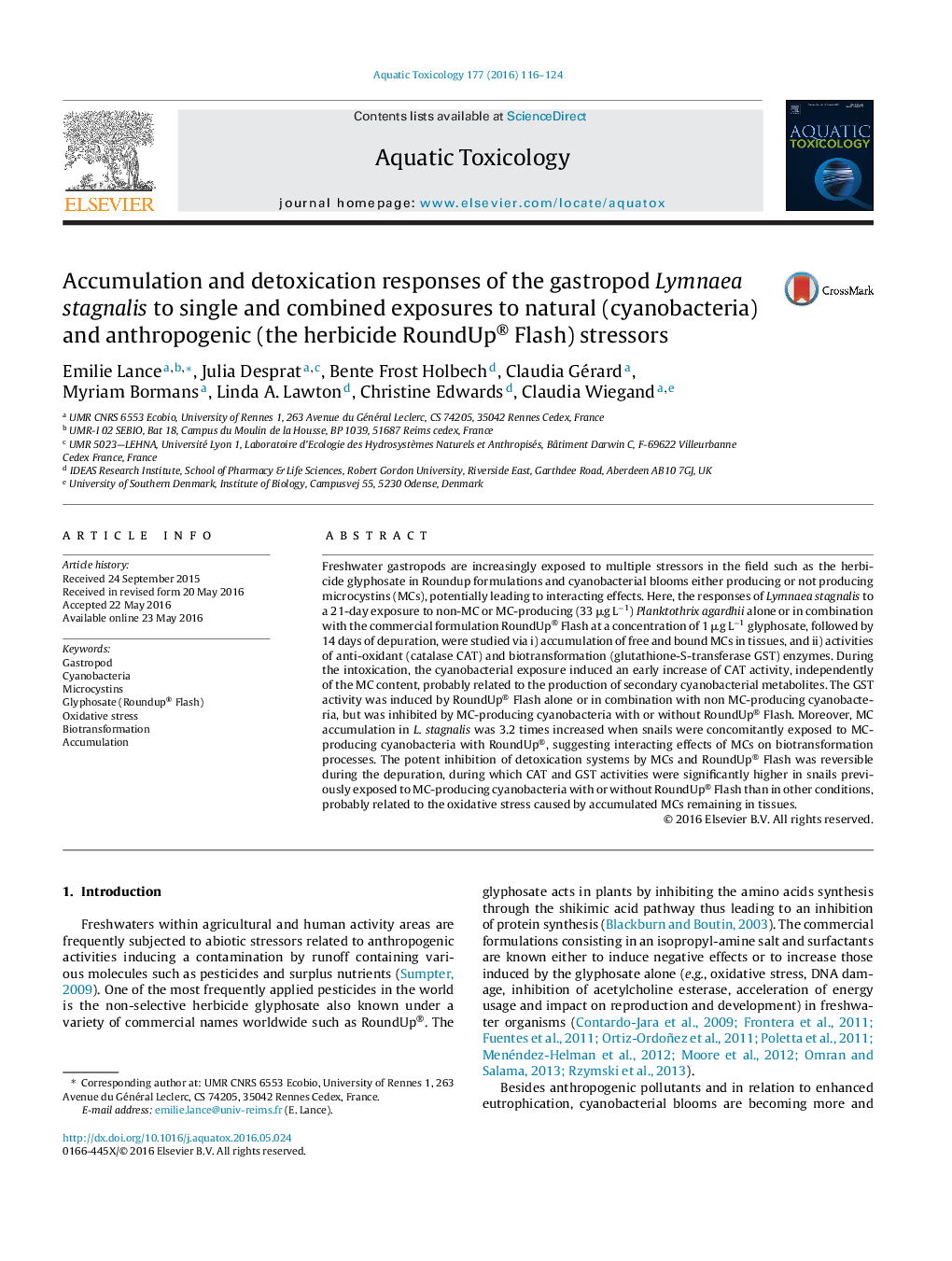| کد مقاله | کد نشریه | سال انتشار | مقاله انگلیسی | نسخه تمام متن |
|---|---|---|---|---|
| 6381991 | 1625928 | 2016 | 9 صفحه PDF | دانلود رایگان |
عنوان انگلیسی مقاله ISI
Accumulation and detoxication responses of the gastropod Lymnaea stagnalis to single and combined exposures to natural (cyanobacteria) and anthropogenic (the herbicide RoundUp® Flash) stressors
دانلود مقاله + سفارش ترجمه
دانلود مقاله ISI انگلیسی
رایگان برای ایرانیان
کلمات کلیدی
موضوعات مرتبط
علوم زیستی و بیوفناوری
علوم کشاورزی و بیولوژیک
علوم آبزیان
پیش نمایش صفحه اول مقاله

چکیده انگلیسی
Freshwater gastropods are increasingly exposed to multiple stressors in the field such as the herbicide glyphosate in Roundup formulations and cyanobacterial blooms either producing or not producing microcystins (MCs), potentially leading to interacting effects. Here, the responses of Lymnaea stagnalis to a 21-day exposure to non-MC or MC-producing (33 μg Lâ1) Planktothrix agardhii alone or in combination with the commercial formulation RoundUp® Flash at a concentration of 1 μg Lâ1 glyphosate, followed by 14 days of depuration, were studied via i) accumulation of free and bound MCs in tissues, and ii) activities of anti-oxidant (catalase CAT) and biotransformation (glutathione-S-transferase GST) enzymes. During the intoxication, the cyanobacterial exposure induced an early increase of CAT activity, independently of the MC content, probably related to the production of secondary cyanobacterial metabolites. The GST activity was induced by RoundUp® Flash alone or in combination with non MC-producing cyanobacteria, but was inhibited by MC-producing cyanobacteria with or without RoundUp® Flash. Moreover, MC accumulation in L. stagnalis was 3.2 times increased when snails were concomitantly exposed to MC-producing cyanobacteria with RoundUp®, suggesting interacting effects of MCs on biotransformation processes. The potent inhibition of detoxication systems by MCs and RoundUp® Flash was reversible during the depuration, during which CAT and GST activities were significantly higher in snails previously exposed to MC-producing cyanobacteria with or without RoundUp® Flash than in other conditions, probably related to the oxidative stress caused by accumulated MCs remaining in tissues.
ناشر
Database: Elsevier - ScienceDirect (ساینس دایرکت)
Journal: Aquatic Toxicology - Volume 177, August 2016, Pages 116-124
Journal: Aquatic Toxicology - Volume 177, August 2016, Pages 116-124
نویسندگان
Emilie Lance, Julia Desprat, Bente Frost Holbech, Claudia Gérard, Myriam Bormans, Linda A. Lawton, Christine Edwards, Claudia Wiegand,